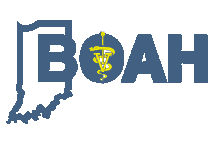Worldwide, many strains of avian influenza (AI) virus can cause varying degrees of clinical illness in poultry. AI viruses can infect chickens, turkeys, pheasants, quail, ducks, geese, and guinea fowl, as well as a wide variety of other birds. Migratory waterfowl have proved to be the natural reservoir for this disease.
AI viruses can be classified into low pathogenic (LPAI) and highly pathogenic (HPAI) forms based on the severity of the illness they cause. Most AI virus strains are LPAI and typically cause little or no clinical signs in infected birds. However, some LPAI virus strains are capable of mutating under field conditions into HPAI viruses.
HPAI is an extremely infectious and fatal form of the disease for chickens. The U.S. Department of Agriculture's (USDA) Animal and Plant Health Inspection Service (APHIS) works to keep HPAI from becoming established in the U.S. poultry population. HPAI can strike poultry quickly without any infection warning signs. Once established, the disease can spread rapidly from flock to flock. It is essential for the U.S. poultry industry to be alert to this disease threat.
Clinical Signs
Birds affected with HPAI may show one or more of the following signs:
Sudden death without clinical signs
Lack of energy and appetite
Decreased egg production
Soft-shelled or misshapen eggs
Swelling of the head, eyelids, comb, wattles, and hocks
Purple discoloration of the wattles, combs, and legs
Nasal discharge
Coughing, sneezing
Incoordination
Diarrhea
Hoosier bird owners who notice these signs should report them to:
1-866-536-7593.
Biosecurity Measures
On the Farm
Poultry producers should strengthen biosecurity practices to prevent the introduction of HPAI into their flocks. The following are some sound biosecurity practices:
Keep an "all-in, all-out" philosophy of flock management.
Protect poultry flocks from coming into contact with wild or migratory birds. Keep poultry away from any source of water that may have been contaminated by wild birds.
Permit only essential workers and vehicles to enter the farm.
Provide clean clothing and disinfection facilities for employees.
Thoroughly clean and disinfect equipment and vehicles (including tires and undercarriage) entering and leaving the farm.
Do not loan, or borrow equipment or vehicles to/from other farms.
Avoid visiting other poultry farms. If you do visit another farm or live-bird market, change footwear and clothing before working with your own flock.
Do not bring birds from slaughter channels, especially live-bird markets, back to the farm.
At Live-Bird Markets (Livestock Sale Facilities)
To prevent a possible outbreak of HPAI, poultry producers and dealers must also use biosecurity precautions at live-bird markets. Live-bird markets operate in many major cities.
Avian influenza viruses can be introduced into these markets if they receive infected birds or contaminated crates and trucks. Once the virus is established in the market, the movement of birds, crates, or trucks from a contaminated market can spread the virus to other farms and markets.
Therefore, the following protective measures should be taken at live-bird markets to prevent the possible spread of disease:
Use plastic instead of wooden crates for easier cleaning.
Keep scales and floors clean of manure, feathers, and other debris.
Clean and disinfect all equipment, crates, and vehicles before returning them to the farm.
Keep incoming poultry separate from unsold birds, especially if birds are from different lots.
Clean and disinfect the marketplace after every day of sale.
Do not return unsold birds to the farm.
For more specific information about biosecurity and cleaning and disinfection practices, contact your local USDA APHIS' Veterinary Services (VS) office. Indiana's USDA APHIS VS office may be reached at: 317-347-3100.
Disease Prevention
USDA requires that all imported birds (poultry, pet birds, birds exhibited at zoos, and ratites) be quarantined and tested for this virus before entering the country.
In addition to international import restrictions, APHIS and state veterinarians specially trained to diagnose foreign animal diseases regularly conduct field investigations of suspicious disease conditions. This surveillance is assisted by university personnel, State animal health officials, USDA-accredited veterinarians, and members of industry who report suspicious cases.
Furthermore, APHIS and state animal health officials work cooperatively with the poultry industry to conduct surveillance at breeding flocks, slaughter plants, live-bird markets, livestock auctions, and poultry dealers.
APHIS veterinarians are working with their state counterparts and the industry to implement measures such as quarantine, control, and cleanup to prevent opportunities for the virus to spread.
What should I do if I suspect HPAI in my flock? Call the USDA Veterinary Service office at: 1-866-536-7593.
